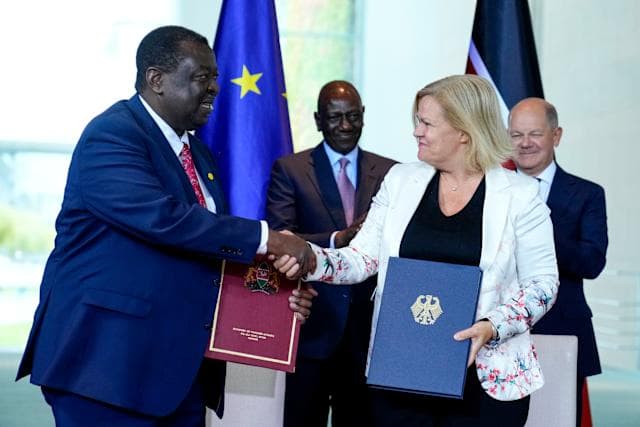We're loading the full news article for you. This includes the article content, images, author information, and related articles.
A slight rebound in German industrial orders for September offers a fragile glimmer of hope for Europe's economic engine, but persistent weakness signals continued uncertainty for Kenyan businesses reliant on the country's machinery, vehicles, and chemical imports.

NAIROBI, Wednesday, November 5, 2025 (EAT) – Germany’s manufacturing sector saw a modest increase in new orders in September, breaking a four-month losing streak but failing to dispel broader concerns over the health of Europe's largest economy, a critical trade and development partner for Kenya.
Data released on Wednesday by the Federal Statistical Office, Destatis, showed that price-adjusted new orders in manufacturing rose by 1.1% month-on-month. This figure slightly surpassed the 0.6% increase predicted by analysts. However, the positive monthly figure was overshadowed by data showing that orders for the entire third quarter of 2025 were down by 3.0% compared to the second quarter, highlighting a persistent industrial slump.
The German Ministry for Economic Affairs and Energy cautioned against over-interpreting the monthly uptick, stating the outlook remains “fragile” amid ongoing geopolitical uncertainties and supply chain vulnerabilities. This sustained economic fragility in Germany carries direct and significant implications for Kenya's economy, which depends on German industry for a wide range of capital and consumer goods.
Germany is one of Kenya's most significant trading partners within the European Union, serving as a primary source of high-value imports essential for industrial and infrastructural development. According to the Observatory of Economic Complexity (OEC), key Kenyan imports from Germany include specialized machinery, pharmaceutical products, vehicles, and chemicals. In June 2025 alone, Kenya's imports from Germany totaled €21.6 million.
A slowdown in German manufacturing can lead to several adverse effects for Kenyan businesses:
Conversely, Kenya is a significant exporter to Germany, with top products including coffee, cut flowers, and tropical fruits. While a German slowdown could dampen consumer demand for these goods, trade data from June 2025 showed a 42% year-on-year increase in Kenyan exports to Germany, indicating resilient demand in specific sectors.
The September rebound in German factory orders was largely driven by a 3.5% increase in foreign demand, while domestic orders surprisingly fell by 2.5%. This divergence suggests that while international appetite for German goods saw a slight recovery, confidence within Germany itself remains weak. The automotive industry was a key driver, with orders rising 3.2% after a sharp fall in August.
This data aligns with other recent economic indicators. The Ifo Business Climate Index, a closely watched measure of corporate sentiment, rose to 88.4 points in October from 87.7 in September, primarily due to improved future expectations. However, companies' assessment of their current situation worsened, reflecting the mixed and uncertain economic environment.
The broader economic forecasts for Germany remain muted. The International Monetary Fund (IMF) projects a meager 0.2% real GDP growth for 2025, while the German central bank, the Bundesbank, expects the economy to stagnate this year before picking up slightly in 2026. These forecasts are clouded by risks from international trade policies and persistently high energy costs.
As the Eurozone's economic anchor, Germany's performance has a ripple effect across the continent and globally. A prolonged period of stagnation could weaken the entire EU market, a vital destination for East African exports. The European Central Bank's monetary policy, heavily influenced by German economic health, also impacts borrowing costs and investment flows into emerging markets, including Kenya.
Germany is also a major development partner. In the most recent bilateral negotiations (2022-2024), the German government committed €153 million in new funding for cooperation in areas like climate, energy, and agriculture. While this funding is typically governed by long-term agreements, a sustained domestic economic crisis could influence future aid budgets.
For now, the slight uptick in German factory orders provides a momentary statistical relief but does little to alter the challenging underlying economic narrative. Kenyan businesses and policymakers will need to monitor the situation in Europe's powerhouse closely, as its path to a sustained recovery will have far-reaching consequences for supply chains, import costs, and economic partnership in East Africa.
Keep the conversation in one place—threads here stay linked to the story and in the forums.
Sign in to start a discussion
Start a conversation about this story and keep it linked here.
Other hot threads
E-sports and Gaming Community in Kenya
Active 9 months ago
The Role of Technology in Modern Agriculture (AgriTech)
Active 9 months ago
Popular Recreational Activities Across Counties
Active 9 months ago
Investing in Youth Sports Development Programs
Active 9 months ago